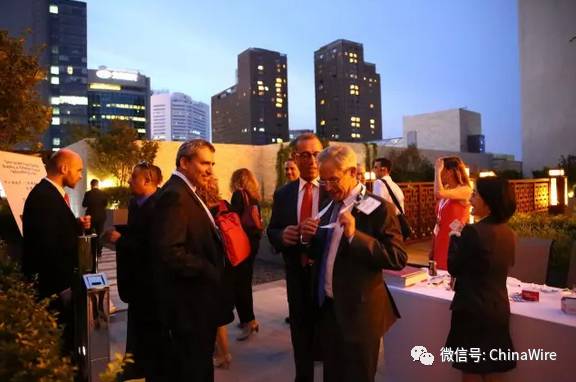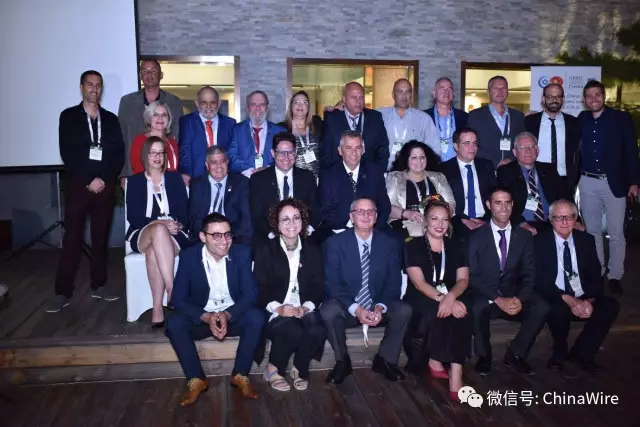
On September 5th, 2017, IsCham together with Sinergia company, hosted the “Sino Israeli Real Estate: Building a Greener Future” Networking Event which took place on the beautiful terrace of the Hilton Hotel Beijing.
The event was presided over by his excellency the Minister of Environmental Protection, Mr. Zeev Elkin, and Mr. Zvi Heifetz, Ambassador of Israel in China. As well as other distinguished guests from the industry of construction, infrastructure, and green building from both countries. Mr. Qiu Ming from Kuntin Group gave the keynote speech “China’s Industrial Real Estate Opportunities and the OBOR Initiative”. Madam He, CEO of Orient Lanscape, also honored us with her presence. CRI, ChinaWire, International Business Daily, Global Times as well as Caixin were also there, reporting this great event.

Israel and China’s bilateral cooperation is growing in many fields; environmental protection is a main one. Both countries emphasize family values and tradition, and therefore the commitment to the next generation is an important legacy. Both countries understand the importance of not only building and developing for further generations but also the need to build and develop with consideration of our earth and the plant we live on. A Greener future for our children.

ChinaWire attended this event and interviewed three major CEOs in attendance. You can read our interviews below, and you can also click the Read More link at the bottom of the page to check out our livestream coverage of the event on YiZhiBo(一直播).
Here is a selection of ChinaWire's interviews from the event:

Kuntin Group CEO Mr. Qiu Ming
Kuntin is a company on the New Third Board Market in China, what is your company’s business about?
The Kuntin Group was established to help international companies to invest, build factories, and to assist the sales process in China. We begin by finding out which city and what areas are suitable for their business to settle down, thereby setting up the supply chain. Next we try to make sure that their business model matches the Chinese industry model. Then, we help them to be in line with the local government policies. After satisfying these conditions, we provide renovation cost to fix their office depending on what they need and meet their special designs, and take care of the estate management.
What international business have you done in the past?
We mainly provided help to those big enterprises in the past years, such as General Motors US, who’s main China office we operate, as well as ABB, Amazon, BMW, Mercedes Benz’s Support Industry Parks, and in the past with Nokia Industry Park. However over the past three years we have aimed our attention towards smaller and medium-sized American and European enterprises who wish to enter into the Chinese market.

What do you hope to see come from the One Belt One Road regarding Chinese and foreign companies?
The One Belt One Road is the China policy aimed towards Asian development, it’s a good idea and big project to help Chinese commerce go out of China and get the foreign companies to enter China. We did a great job in guiding foreign companies to enter China, but we also want to guide some good and high-end enterprises such as manufacturing and processing industries to step out of China into the market of the One Belt One Road countries. This will hopefully allow the markets of Asia and eastern Europe to come together.
What does Kuntin Group do as far as helping Chinese enterprises?
Today I just came back from Los Angles, I actually just got off the flight. I went to America three times this year and went to Israel last year. We mainly go to America and Europe focussing on technologically advanced countries. We help Chinese companies to understand the government policies, legal regulations and local customs, just like what we do to the foreign enterprises. We need to find out what the requirements that Chinese companies need to meet to operate in these countries.
I also met with the Chinese Consulate General in Los Angles three days ago, they hope we can help in building a incubators in the “China Enterprises Center”. This center is modeled after Silicon Valley, as a place for Chinese enterprises to settle in America. We will also be talking with The Ministry of Commerce following my recent trip to America, because we want to relay our understanding of local policy, law, enterprises regulations etc. to help Chinese enterprises who are willing to develop in America.

Pacific Holdings Group CEO Yuval Ziv
What is Pacific Holdings Group’s business like?
We are a real estate company who deals in commercial and residential properties.
What are your plans in China?
We are new in China, we have just started to operate here in Beijing, to offer a way for Chinese people to diversify their investments. The economy in China is strong and the real estate market has been increasing here for the past 10 years nonstop, however it seems that the market has stabilized. I believe that people in China, Israel and other nations need a way to diversify their portfolios, so we are offering people in China a way to invest in the U.S. in an easy and safe way.
The beauty about our company is that we provide investment opportunities for as little as 55,000 USD, to buy properties in America. The most important aspect of this is the return on investment, currently at around nine percent annually. Also because this is an American investment, it is tied to the dollar so if the Chinese currency goes down you still protect your investment.

How can our readers get involved?
Well our company name is Pacific Holdings Group, and we have an office in Beijing, and we are currently partnering with a Chinese company so that they can either buy through us directly or purchase through the Remux offices in Beijing or elsewhere. Soon we will also have an office in Shanghai, and we plan to have an online presence so that people can buy real estate on the internet as well.
We are very excited to enter into the Chinese market. I was born in Israel and have lived for many years in the United States, so you might call me Israeli-American. I have seen the Israeli market, the United States market, and now I get to see the Chinese market. I think there is great potential for growth for my company, and any international company that would like to do business in China. I think the Chinese people are very welcoming.

Orient Landscape CEO Madam He Qiao
What are the technologies in Israel that are more advanced than in China as far as environmental protection is concerned?
From what I understand, how they deal with agricultural water saving systems is more advanced than in China. They also have interesting technology for recycling water downstream of power plants, as well as having advanced countryside sewage systems. In China we have a sewage collecting system, but in the countryside it is still lacking. So hopefully we can import their technology to the rurla China.
What areas or markets are Israeli enterprises really interested in China?
River pollution management businesses such as Orient Landscape are probably the biggest ones right now in China, they would really like to share their technology to help us solve these issues. They are also very adept in dealing with water shortages. In Israel their water shortage problems are far more serious than in China, however they have creative solutions to their problems, and that is something we must learn from them.

How do you see the future of the environmental cleenup business in China developing?
There are so many regulations now for factories, so they can not just dump their industrial waste. Our role is to help these companies deal with their waste responsibly, so our business is becoming busier.
We are the biggest industrial waste restoration company in China, we have 100 companies that process 10 million tons of waste a year. We are also the biggest in handling river and ocean clean up. We try to focus on disappearing water fields and the ecological damage caused by climate change.
We have already signed contracts for 140 billion RMB, and have reached a framework agreement for 500 billion RMB. We originally started as a garden building business. We built 100 parks in 100 cities, some of the most beautiful gardens in many cities, such as the Beijing’s Olympic Centre Park, Beijing’s Bird’s Nest, Suzhou’s State Hotel, and the Suzhou to Beijing super highway. But now we are shifting our mission to become the best water ecology restoration company in China, with the goal to clean up the water in 200 river and lakes.
The reason why we want to focus on this issue is because rivers have diminished a lot over the past 60 years in China. Many wetlands have disappeared as well. Water and land loss caused by desertification, glacial disappearance, groundwater depletion, are major issues for China moving forward. We want to help in these areas, as well has helping to clean up the areas damaged by industrial waste and cultivated land use.
What should we expect to see from cooperation between China and Israel?
Firstly, Israel is very great and respectful country. They have achieved many successes in dealing with water usage issues, specifically in how they manage their water for agricultural purposes. After seeing the successes of Israel, we now have hope that we can deal with the environmental issues in China. With the rapid development of Oriental Landscape, we intend on focusing our resources on new energy sectors, and hope to learn from Israel in this field as well. We believe that China can benefit greatly from Israel’s technology and that Israel can benefit greatly from having access to the Chinese market.

